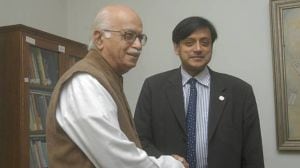Varsity pushing Pune as healthy city
PUNE, Nov 16: The University of Pune's School of Health Sciences has taken up the task of pushing Pune's case to become eligible for the he...

PUNE, Nov 16: The University of Pune’s School of Health Sciences has taken up the task of pushing Pune’s case to become eligible for the healthy city for better life’ project of the World Health Organisation (WHO). The Government is yet to take any concrete intiative in this direction.
The ambitious project, launched by the WHO in 1996, envisages the creation of a network of healthy cities’ in the world, which qualify for the status on the basis of the intiative and commitment for environment protection of their respective governments.
The healthy city’ status, once granted, will not only open floodgates for a series of internationally standardised environment preservation programme but at the same time will also facilitate link up with other healthy cities for technical collaborations and exchange of knowledge programmes.
But surprisingly, while many developed nations in Europe and even the Third World countries from African continent, Iran, Indonesia and India’s neighbour Bangladesh have grabbed the opportunity, India is yet to send a formal proposal. This, despite the fact that the regional office of WHO for the entire SouthEast Asia is located at New Delhi.
Not waiting for political desire and Government intiative, the varsity’s has decided to support Pune’s case at its level for the status.
“We have offered all help to the local self-government for the compilation and documentation work required for the project. Besides we have also shown our readiness to undertake any research work or studies for this matter”, said Dr. Bhushan Patwardhan, head of the school.
Taking a leap forward, the department has joined hands with the Pune Municipal Corporation to contribute for the Agenda 21 document. The document, besides looking into various sustainable development issues, will compile the various actions and intiatives taken for the environment preservation at the local level.
“The document will highlight what all has been done towards environment protection by government, non-governmental organisation, institutions and individuals in field of sustainable development," said Patwardhan.
The consistent efforts of the department have received a shot in the arm with the PMC, Pimpri-Chinchwad Municipal Corporation (PCMC) and Association of Friends of Germany having agreed to establish an International Office Agenda 21′ in the city. The office will become functional by the end of November, said Vijay Mahajani, chairman of the association.
Mahajani further said Pune will be formally proposed for the project during the Local Agenda 21 Conference, being organised by National Foundation of India Ltd in New Delhi tomorrow.
“Once the document of Agenda 21 is out, it will only be complementary to city’s claim for the healthy city," said Patwardhan adding that the document once compiled will be forwarded to the State and Centre for following up the matter at their levels.
“A city’s case for the status should be supported by the commitment expressed by the respective government and intiative at the local level. There is lack of awareness in India about this bright project. We have not sincerely followed it up,"said Patwardhan. Under the programme, being successfully implemented by 42 countries world-wide, WHO gives technical support to indentify the environment and health problems. The organisation besides making available the experts and required manpower for the project also forms a group to make a plan of action for the healthy city programme.
Financial aid is also provided for actual monitoring of studies and provision of various instruments.
“In the healthy city programme, apart from carrying out the studies and research for identification of environmental problems, remedies for the local specific problems such air and water pollution are also provided,"said Patwardhan.
He added that the healthy cities can operate in the form of a information network partners exchanging information and solutions for their common problems.



- 01
- 02
- 03
- 04
- 05




























